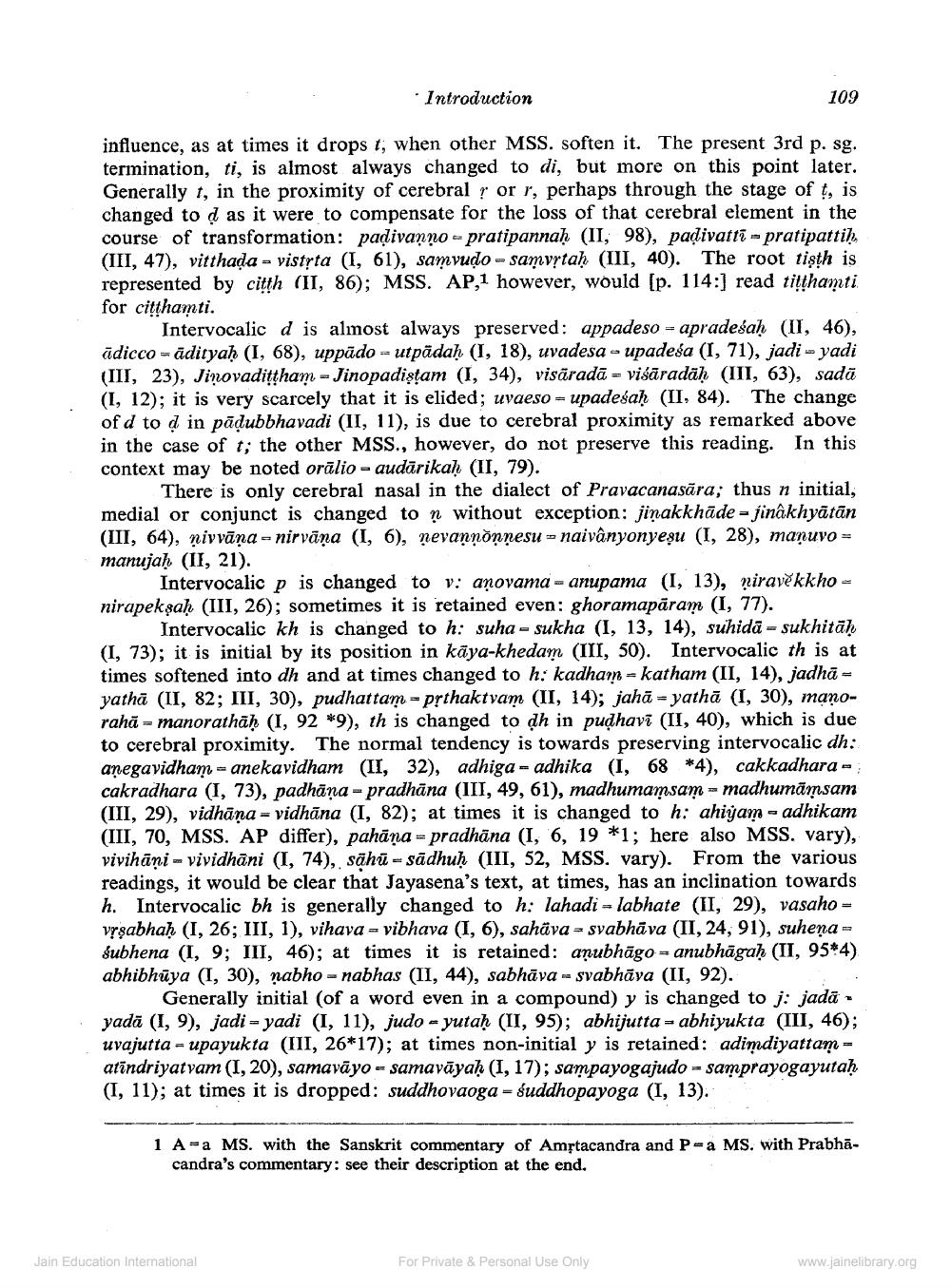________________
Introduction
109
influence, as at times it drops t, when other MSS. soften it. The present 3rd p. sg. termination, ti, is almost always changed to di, but more on this point later. Generally 1, in the proximity of cerebral ? or r, perhaps through the stage of t, is changed to d as it were to compensate for the loss of that cerebral element in the course of transformation: padivanno - pratipannaḥ (II, 98), padivattī - pratipattih, (III, 47), vitthada - vistyta (I, 61), samvudo - samvrtaḥ (III, 40). The root tişth is represented by citth (II, 86); MSS. AP,1 however, would (p. 114:) read titthamti for citthamti.
Intervocalic d is almost always preserved: appadeso - apradeśaḥ (II, 46), ādicco - ādityaḥ (I, 68), uppādo - utpädah (I, 18), uvadesa - upadesa (1, 71), jadi - yadi (III, 23), Jinovadittham - Jinopadistam (I, 34), visāradā - visāradāh (III, 63), sadā (I, 12); it is very scarcely that it is elided; uvaeso = upadeśaḥ (II, 84). The change of d to d in pădubbhavadi (II, 11), is due to cerebral proximity as remarked above in the case of t; the other MSS., however, do not preserve this reading. In this context may be noted orālio - audārikah (II, 79).
There is only cerebral nasal in the dialect of Pravacanasāra; thus n initial, medial or conjunct is changed to ņ without exception: jiņakkhāde - jinakhyātān (III, 64), nivvāņa - nirvāṇa (I, 6), nevannònnesu = naivânyonyesu (I, 28), manuvo = manujah (II, 21).
Intervocalic p is changed to v: anovama - anupama (I, 13), ņiravěkkho - nirapekṣaḥ (III, 26); sometimes it is retained even: ghoramapāram (I, 77).
Intervocalic kh is changed to h: suha - sukha (I, 13, 14), suhidā - sukhitāḥ (I, 73); it is initial by its position in kāya-khedam (III, 50). Intervocalic th is at times softened into dh and at times changed to h: kadham-katham (II, 14), jadhā= yathā (II, 82; III, 30), pudhattam - pşthaktyam (II, 14); jahā - yathā (I, 30), manorahā - manorathāh (I, 92 *9), th is changed to dh in pudhavi (II, 40), which is due to cerebral proximity. The normal tendency is towards preserving intervocalic dh: anegavidham - anekavidham (II, 32), adhiga - adhika (1, 68 *4), cakkadhara - cakradhara (I, 73), padhāna - pradhāna (III, 49, 61), madhumamsam - madhumāmsam (III, 29), vidhāņa = vidhāna (I, 82); at times it is changed to h: ahiyam - adhikam (III, 70, MSS. AP differ), pahāna = pradhāna (I, 6, 19 *1; here also MSS. vary), vivihāni - vividhāni (1, 74), sāhū- sādhuḥ (III, 52, MSS. vary). From the various readings, it would be clear that Jayasena's text, at times, has an inclination towards h. Intervocalic bh is generally changed to h: lahadi - labhate (II, 29), vasaho = vrşabhah (I, 26; III, 1), vihava - vibhava (1, 6), sahāva - svabhāva (II, 24, 91), suheņasubhena (I, 9; III, 46); at times it is retained: anubhāgo - anubhāgah (II, 95*4) abhibhūya (1, 30), nabho - nabhas (II, 44), sabhāva -- svabhāva (II, 92).
Generally initial (of a word even in a compound) y is changed to j: jadā - yadā (I, 9), jadi - yadi (I, 11), judo - yutah (II, 95); abhijutta - abhiyukta (III, 46); uvajutta - upayukta (III, 26*17); at times non-initial y is retained: adimdiyattamatīndriyatvam (I, 20), samavāyo - samavāyaḥ (I, 17); sampayogajudo - samprayogayutaḥ (I, 11); at times it is dropped: suddhovaoga - suddhopayoga (I, 13).
(I, 11); atram (I, 20), samo26*17); at tin
1 A-a MS. with the Sanskrit commentary of Amrtacandra and P-a MS. with Prabhā
candra's commentary: see their description at the end.
Jain Education International
For Private & Personal Use Only
www.jainelibrary.org




